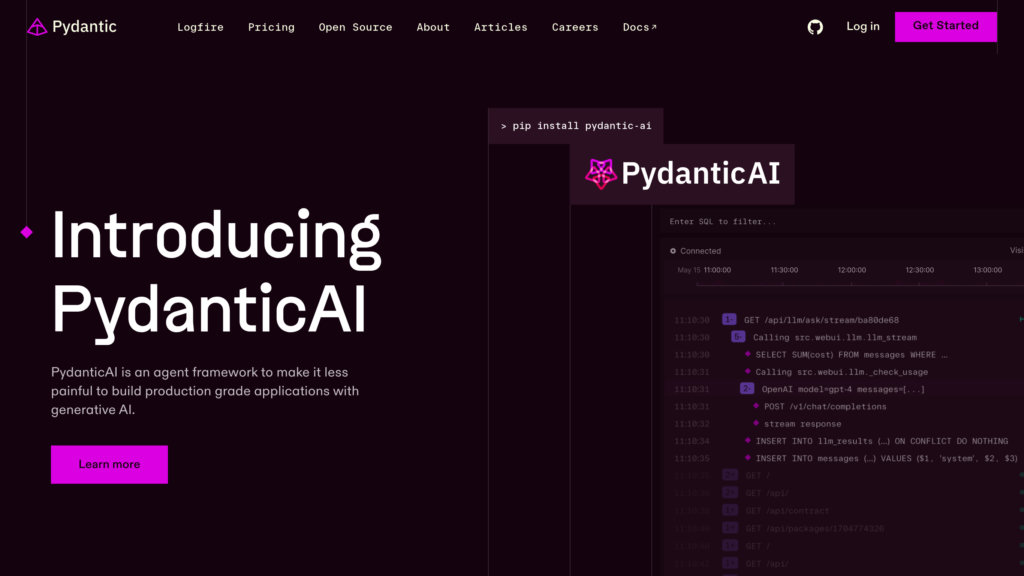Pydantic
A fast, extensible Python library for data validation and settings management using type annotations.
Community:
Product Overview
What is Pydantic?
Pydantic is a widely adopted Python library that enforces data validation and serialization through Python type hints. It enables developers to define data models with minimal code while ensuring data integrity and type safety at runtime. Pydantic's core validation engine is implemented in Rust, making it one of the fastest validation libraries available. It supports strict and lax validation modes, custom validators, and seamless integration with Python's typing system, including dataclasses and TypedDicts. Pydantic is heavily used in the Python ecosystem, powering popular frameworks like FastAPI and LangChain, and is trusted by major tech companies worldwide.
Key Features
Type-Hint Driven Validation
Leverages Python's native type annotations to automatically validate and parse data, reducing boilerplate and improving IDE support.
High Performance
Core validation logic written in Rust ensures fast data processing suitable for production environments.
Flexible Validation Modes
Supports both strict mode (no type coercion) and lax mode (automatic type coercion) to fit different validation needs.
Custom Validators and Serialization
Allows developers to define custom validation rules and serialization behavior for complex data handling.
JSON Schema Generation
Automatically generates JSON Schema from models, facilitating integration with other tools and API documentation.
Broad Ecosystem Integration
Used by thousands of Python packages and frameworks, including FastAPI, Django Ninja, and LangChain, ensuring robust community support.
Use Cases
- API Data Validation : Ensures incoming and outgoing data in web APIs conforms to expected types and formats, reducing runtime errors.
- Configuration Management : Manages application settings with type safety and validation, supporting environment variables and complex nested configurations.
- Data Serialization and Parsing : Converts complex Python objects to and from JSON or dictionaries with validation, useful for database and API interactions.
- Runtime Type Enforcement : Validates data at runtime in Python applications, preventing invalid data from propagating through the system.
- Integration with AI and ML Frameworks : Used in AI agent frameworks like PydanticAI to validate and structure outputs from large language models.
FAQs
Pydantic Alternatives
Supabase
Open source Firebase alternative offering a full Postgres backend with integrated authentication, realtime, storage, and edge functions.
HEROZ
AI technology company delivering advanced AI engines and SaaS solutions to optimize business operations and digital transformation.
Modal
Serverless cloud platform enabling scalable, GPU-accelerated execution of AI, ML, and data workloads with instant deployment and pay-per-use pricing.
Scale AI
Comprehensive AI data platform delivering high-quality labeled data, dataset management, and enterprise-grade generative AI solutions.
Pipedream
A serverless integration platform enabling fast API connections, workflow automation, and custom code execution with extensive API support.
fast.ai
A high-level deep learning library built on PyTorch, designed to simplify and accelerate state-of-the-art AI model development.
Cloudera
Enterprise-grade hybrid data platform offering comprehensive data management, analytics, and AI capabilities across any cloud or on-premises environment.
Merge
Unified API platform enabling B2B SaaS companies to integrate with 220+ third-party applications through a single connection.
Analytics of Pydantic Website
🇺🇸 US: 20.23%
🇩🇪 DE: 18.67%
🇮🇳 IN: 7.53%
🇳🇱 NL: 6.43%
🇫🇷 FR: 4.25%
Others: 42.88%
